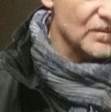Fabrizio Ulivieri's Blog, page 26
December 15, 2024
Ti amo come mai nessuno ha amato
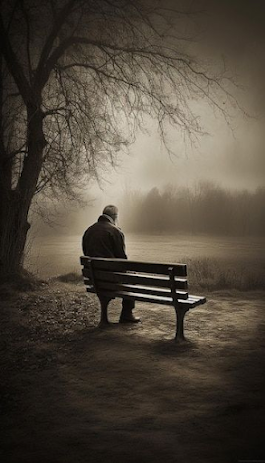 Il tuo nome santo pronuncio senza fine.
Il tuo nome santo pronuncio senza fine.La tua immagine – ossessione senza fine,
Mi appare, e mi ricordo
come nel tuo apparire infinito eri tu.
Sei passato in un attimo - tuttavia.
In un attimo sparito al mondo senza nome,
Indifferente alla sua prole.
Ma non al cuore, al cuore mio rimani,
Eterno come allora.
E i tuoi passi sento di notte.
Le tue carezze nel mio sonno.
Ti sento a me, accanto.
Seduto in disparte e mi guardi
E muto taci - non dici la parola.
Come posso aiutarti?
Come posso dal tuo dolore liberarti?
Dalla tua disperazione che continua di là?
E a me arriva qua e di te mi riempie.
Io ti amo. Ti amo come mai nessuno ha amato.
Come figlio che il padre davvero ama,
Io ti amo, disperato.
Published on December 15, 2024 20:26
Lucore nella notte
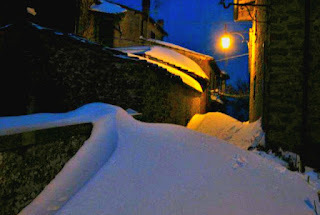
Il chiarore da fuori m' ha svegliato.
Quel bianco lucore m'ha afferrato.
Fuori era la neve. Nella notte
Era caduta. Tutto si chetava.
La luce del bianco mi stupiva.
Mi attraeva. Come fosse voce
Di qualcosa più lontano. Taceva.
Non parlava. Guardava e sorrideva.
È un soffio. Lo ho ben inteso.
È un soffio tua vita. Ha ripreso.
Come questo biancore - c' è ma non è.
Published on December 15, 2024 02:55
Lucore di notte

Il chiarore da fuori m' ha svegliato.
Quel bianco lucore m'ha afferrato.
Fuori era la neve. Nella notte
Era caduta. Tutto si chetava.
La luce del bianco mi stupiva.
Mi attraeva. Come fosse voce
Di qualcosa più lontano. Taceva.
Non parlava. Guardava e sorrideva.
È un soffio. Lo ho ben inteso.
È un soffio tua vita. Ha ripreso.
Come questo biancore - c' è ma non è.
Published on December 15, 2024 02:55
December 14, 2024
Pazza, pazza idea di cambiar vita
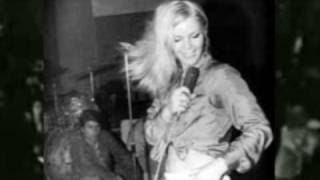
Pazza, pazza idea di cambiar vita.
Folle folle idea ricominciar
Di qua in questa terra scolorita,
Nel gelo estraneo che vive in me
Nel vento di ghiaccio che mi rinasce.
Folle, folle idea viver qua con te
Nel grigio sole - nel gelo calore.
Pazza, pazza idea esser qua per amore
Di te ma vivere solo - altrove.
Folle, folle, folle idea star qua
Chiuder gli occhi e non saper dove.
Published on December 14, 2024 09:38
December 13, 2024
All'alba vincerò
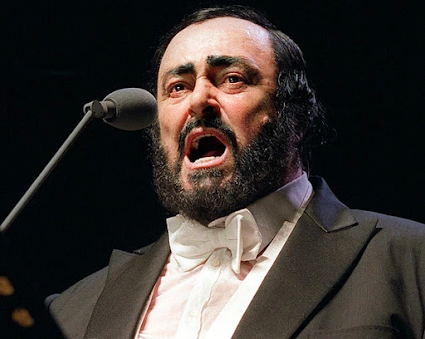
Tu pure, o, Mio Io
nella tua confusa speranza
cedi a fredda notte
il gelo di tua possanza
di luci morte mai interrotte
e ti parli il mistero di un dio
di cui il nome nessun dirà
ma il tacere scioglierà
del cielo che io presenzio.
Muto dilegui nel silenzio
L'indifferente tenebra
che in me sua presa celebra.
Dilegua notte dilegua - io so
che all'alba vincerò.
Published on December 13, 2024 14:03
December 11, 2024
Oltre la maschera il tutto
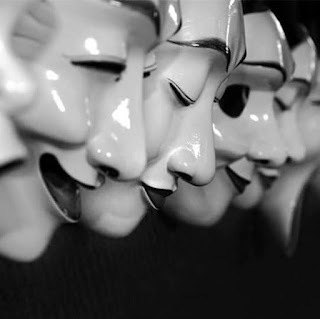
Tu che agli occhi negasti il vero
e desta tenesti la mente viva
di un corpo che la vuole priva
tu sei la luce vera del pensiero.
E quel che tu riflesso vedi taglia
di ogni valor il tuo amor via
che non riman di te la signoria
ma tua voce vive in fonda faglia.
Questa vista di me che non io sono
dagl'occhi crudeli e vaghi muove
ma la domanda eterna a me rinnova
chi di quella voce sia il vero suono
se l'anima o un più che la promuove
che in altro lato di sé ne dà prova.
Published on December 11, 2024 21:27
December 9, 2024
Per mio padre il destino aveva parlato
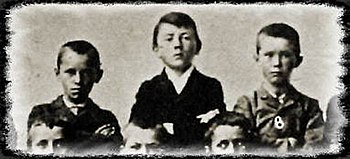
Per mio padre il destino aveva parlato
Questo romanzo è stato scritto nel 2006. Poi per uno strano caso del destino (chiamiamolo così, ma il destino non esiste) perso completamente è riemerso oggi, nel 2024.Parla del nazismo, di Hitler, della famiglia di Hitler, del padre di Hitler.Parla dei tanti personaggi, veri, che diedero forma al nazismo attraverso l'esoterismo. Impossibile capire il nazismo se non se ne analizza anche le componenti, spirituali, magiche e esoteriche.Se non si scruta in tutti quegli innumerevoli personaggi che contribuirono ad aprire attraverso il nazismo esoterico la strada del Male e a portare al potere Adolf Hitler, formandolo e preparandolo come un Messia del male.Una miriade di personaggi che si muovono in una miriade di mondi e miti occulti paralleli. Un personaggio, Hitler, che non è emerso dal Nulla, ma da un Male che nel suo farsi strada nel mondo lo aveva prescelto come suo Attuatore e posto al potere perché iniziasse una delle fasi più orribili della storia del genere umano. Ma il nazismo non è morto, come si evince dalle ultime pagine del romanzo. Sì è solo trasformato. Ed è tutt'ora vivo. E' divenuto altro. Ha assunto la faccia di tante false democrazie, di istituzioni apparentemente democratiche, e di nuovo accompagna la venuta di un Messia ancora più potente e più distruttivo: L'Anticristo. Il libro fìnisce con lo scenario di un Bene che non muore. Di un Bene che resiste e vive nelle persone umili e che sarà sempre l'antagonista del Male fino alla vittoria e al trionfo del Bene sul Male.
Leggi su Academia: https://www.academia.edu/126165382/Per_mio_padre_il_destino_aveva_parlato
Published on December 09, 2024 03:02
December 8, 2024
Le maschere di Nieztsche
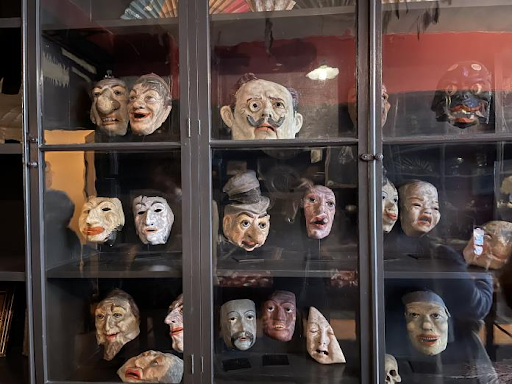
Io con Nietzsche non trovo mai accordo.
Che leviamo una maschera discordo.
Differiamo. L'esterno non conosce
Il dentro e le vive sue angosce
Perché dentro vi è un animale:
Vive amor ma il male v'è uguale.
E può anche Dio lí intimo regnare.
Spesso lo guardi e chi è quello chiedi
Quello che allo specchio ora vedi
E ti guarda "Davvero sono io?".
È di luci e di ombre luccichio.
Prega quel balenío apran gli dèi
E in loro forza va' verso chi sei.
Che da alta città il respiro venga
E vivo qui in basso si mantenga.
E maschera non c'è conoscerai
Se non d' essere lui deciderai
Che fuori sei, ma stare in quel Dio
Che a Satana non dà te, in oblio.
Published on December 08, 2024 21:05
December 6, 2024
Silvia
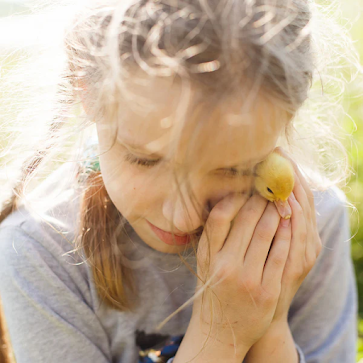
Silvia ti ricordo quando eri bambina.
Avevi riccioli d'oro e tanto
Somigliavi alla tua piccolina
Che ora sorride a te birichina.
Matilde l'hai chiamata come nel libro
Che ti leggevo la sera che a letto andavi.
Cadevi dal tavolo, ricordo, e piangevi.
Parlavi tanto e a mio lato destro andavi
Minuta ombra del sole alto a mezzogiorno
Accompagnavi me ogni giorno.
Tutto cambia e nuovo mondo di demoni
Oggi viviamo - che odiano l'amore
Che vogliono noi lontani e senza parola.
Da maschere di un nulla che non ci
Appartiene, da loro divertiamo
E apriamo vie soprannaturali.
Nella preghiera diamo respiro e ali.
Da quando eri la mia bambina
Che fra le braccia stringevo forte
Voliamo via dalle loro parole storte.
Vicina ora vivi negli occhi miei, come quando
la tua lontana china fissavi sola, tu, sperando.
Published on December 06, 2024 17:51
December 5, 2024
Mindaugas

He woke up a little late that morning. The air in the room was heavy, carrying the silence only winter knows. He looked out the window.
Grey.
The sun—when had he last seen it? Three months ago, perhaps. Or longer.
For an Italian, the climate was the hardest thing to bear in this country, where he had now lived for five years. It oppressed him—this cold, colourless land. The land of grey and snow.
In this country, there were many things he did not like.
For example, the crows. He saw them now, scattered like black stains across the snow beneath the skeletal trees. They moved clumsily, with a bouncing gait, their dark feathers glinting sinisterly in the pale light, their harsh cries raking the still air. He despised them. Vile, graceless animals, symbols of something sinister.
Evil, he thought.
Evil had been a steady, growing presence in his life since 2020.
He had lived surrounded by feelings of oppression, distrust, and surrealism. These feelings had driven him into regions of the mind he had never before dared to explore—regions where his consciousness ascended to heights he had neither imagined nor sought. But such ascents, he realized, had their cost.
Now, he felt tired. He was tired of thinking. Tired of searching for the truth. Tired of the unrelenting demands he had placed upon his own mind.
But why?
The question hovered, unresolved, until he turned it inward. For a few seconds, he let himself think.
And he knew why.
He didn’t know who he was anymore. Yes, that was it. The truth of it struck him.
In this furious search for truth, he had lost himself. The pursuit had consumed him, eclipsing everything else, until truth had grown more important than himself.
He had severed his connection to himself—lost all sense of attachment to the person he once was.
Any sense of self-love had disappeared.
Mindaugas had written to him in the middle of the night. When he woke, Matteo saw the message:
See you tomorrow at 10. At Huracán. Let’s talk about the project.
Mindaugas belonged to a type common to this austere homeland—shaped, perhaps dictated, by the gelid weather and grey skies.
He had long black hair and handlebar moustaches.
He was a man of plans—plans that were, no doubt, half-formed, prone to confusion, yet resolutely clung to. And still, beneath his resoluteness lay a restlessness, a hunger for something he could neither name nor define.
This was the Lithuanian paradox: a surface calm that belied the ceaseless turbulence within.
When Matteo stepped outside, the snow was falling.
He took a deep, experimental breath of the morning air. It was fresh—sharp and strong. It filled his lungs, exploding powerfully inside.
The coffee shop was situated in the Panorama shopping mall—on the first floor, which, in Lithuania’s curious reckoning, was the second. Its interior design was plain to the point of severity: a long black counter stretched from the elevator to the right, carving a narrow path between itself and a partition wall that enclosed the tables within.
Against the central wall, two sofas, upholstered in what appeared to be aged leather, exuded a weary, lived-in air. The tables and chairs, uniformly black, stood in tidy rows. To the left, a glass balustrade overlooked the floor below, offering a glimpse of other shops and passersby.
The place, with its grey-green walls and cold gleam of metallic countertops, seemed designed less to invite than to withstand.
And yet, Matteo liked it here. The austerity and surreal anonymity sharpened his focus. He found it conducive to work, to creativity, to hours well spent alone among nameless people.
He reached the coffee shop a few minutes before the appointed time, sat at his usual spot, and let his gaze wander. He imagined the snow continuing to fall beyond the enormous upper skylight visible from his table, now.
Mindaugas arrived.
More than a Lithuanian, he looked like someone straight out of a Western movie, with his long black hair and a handlebar moustache that seemed to belong to another era.
He wore a Russian ushanka, the kind that covered his ears. But he certainly wasn't the type to love Russia. He had absorbed all the anti-Russian sentiment that was common here.
When I first spoke to him, he said plainly, "I speak Spanish and Russian. I had to learn Russian at school, but it’s a useless language—good for nothing."
Like most Lithuanians, he was firmly pro-Ukrainian and openly Russophobic.
There were some, though, who thought it made no sense to hate every Russian living here.
Being Russian didn’t mean you were worse than the Ukrainians who had recently arrived.
Many people were angry because the Ukrainians were treated too well. A Ukrainian car parked illegally might be left alone, while a Lithuanian car in the same spot would get fined immediately.
It was the kind of thing that chafed many people in Vilnius.
Published on December 05, 2024 22:16

